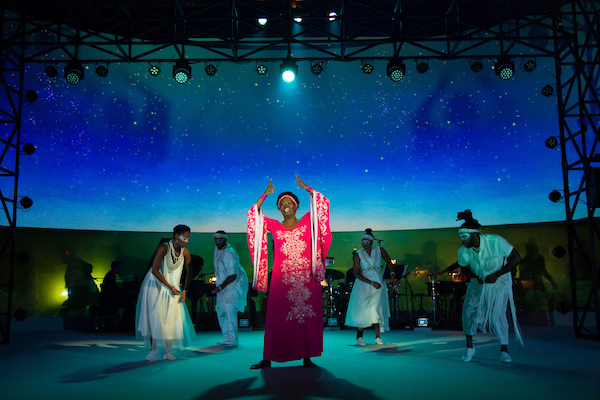Theater Review: “Dreaming Zenzile” — The Miriam Makeba Story
By Noah Schaffer
Despite its flaws, Dreaming Zenzile reflects, with power, on the difficult relationship between art and activism.
Dreaming Zenzile, written and performed by Somi Kakoma. Directed by Lileana Blain-Cruz. A world premiere tour presented by Arts Emerson (a co-production with Octopus Theatricals, Repertory Theatre of St. Louis, Apollo Theater, McCarter Theatre Center, New York Theatre Workshop & National Black Theatre) at the Emerson Paramount Center, Robert J. Orchard Stage, 559 Washington Street, Boston, through February 27.

A scene featuring Somi Kakoma in Dreaming Zenzile at The Repertory Theatre of St. Louis. Photo by: T Charles Erickson
Near the beginning of Dreaming Zenzile, Somi Kakoma’s new musical about Miriam Makeba, the performer protagonist, as played by Kakoma, reluctantly surveys the audience at what would be her final concert in Italy. “They just know me for ‘Pata Pata’ and ‘Click Song,’” she surmises.
That would probably be a good assumption about many of those coming to see the show at ArtsEmerson. And that ignorance is just what Kakoma wants to redress. The musical’s title reclaims Makeba’s birth name, and Kakoma’s script does a fine job of filling us in on the amazing trajectory of the singer’s expansive career. She may have had only one signature song, but Makeba went from being the daughter of a moonshiner mother, who was sent to jail with her daughter 18 days after Makeba was born, to become one of the first, and more enduring, global music superstars. Besides her personal struggles, Makeba paid a heavy price for her political activism, spending decades in exile from Apartheid South Africa, only to also be blacklisted in America because of her 1968 marriage to Black Panther Stokely Carmichael.
The program’s cast list includes Kakoma (who has a significant career as the Afro-jazz artist Somi), a quartet of singers, and a backing band. So the assumption is that this will be a one-woman musical. But director Lileana Blain-Cruz has gathered together an exceptionally talented crew of singer/dancer/actors who skillfully step into the roles of a number of different characters in Makeba’s life story: family members, friends, and lovers. (Note: one cast member had been injured just before the opening night performance I attended. Helen Marla White stepped in — she mostly sat near the band and provided vocals while the other three moved on stage. What would be a disaster for many other productions worked fine here.)
While the stage set is very minimal, the troupe’s agile movement (accented by effective lighting design from Yi Zhao) provides compelling visuals. Less impressive was the sound. Even forgiving opening night snafus, such as a crackling microphone, the mostly acoustic instrumental quartet was poorly mixed. The sound from my balcony seats was often flat and dull.
At its best moments — and there are many — Dreaming Zenzile goes beyond the facts of Makeba’s story and supplies some of her great musical moments, well beyond “Pata Pata.” (The script reveals that Makeba didn’t especially like the song). The scene featuring “Malaika,” a tune Makeba recorded with Harry Belafonte, is a real tour de force, thanks to Kakoma’s singing and an upright bass solo from Senegal’s Pathé Jassi. So is the Apartheid protest anthem “Hapo Zamani,” which was written by another South African jazz great, Dorothy Masuka. (Makeba’s one-time husband and frequent collaborator Hugh Maskela is only briefly mentioned.)
Less effective are the nine Kakoma originals, which clog up the first half with musical theater sap. An annoyingly arranged jazz medley would not have gone over at the Harlem clubs Makeba first gigged at when she reached the US.
Still, despite its flaws, Dreaming Zenzile reflects, with power, on the difficult relationship between art and activism. And yes, the audience is given a chance to get up and dance to “Pata Pata.”
Noah Schaffer is a Boston-based journalist and the co-author of gospel singer Spencer Taylor Jr.’s autobiography A General Becomes a Legend. He also is a correspondent for the Boston Globe and DigBoston, and spent two decades as a reporter and editor at Massachusetts Lawyers Weekly and Worcester Magazine. He has produced a trio of documentaries for public radio’s Afropop Worldwide, and was the researcher and liner notes writer for Take Us Home – Boston Roots Reggae from 1979 to 1988.
